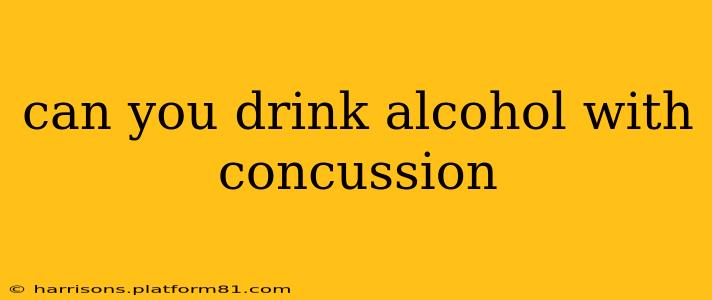Can You Drink Alcohol With a Concussion? The Definitive Answer is NO.
A concussion, a type of traumatic brain injury (TBI), is serious and requires careful management. One of the most crucial aspects of recovery is avoiding alcohol. The simple answer is no, you should absolutely not drink alcohol if you have a concussion. Doing so can significantly hinder your recovery and potentially lead to severe complications.
Here's why:
Alcohol is a depressant that slows down brain function. After a concussion, your brain is already vulnerable and working overtime to heal. Consuming alcohol adds extra stress to this already compromised system, potentially prolonging recovery time and increasing the risk of serious complications.
What Happens When You Mix Alcohol and Concussion?
The effects of alcohol on a concussed brain can be multifaceted and damaging:
-
Increased Inflammation: Alcohol can exacerbate inflammation in the brain, which is already a significant factor in concussion recovery. This increased inflammation can further impair brain function and slow healing.
-
Delayed Recovery: Alcohol can significantly delay the healing process. Studies have shown that individuals who consume alcohol after a concussion experience longer recovery times and a higher likelihood of persistent symptoms.
-
Increased Risk of Secondary Injury: Alcohol can impair judgment and coordination, increasing the risk of falls or other accidents that could lead to a secondary brain injury. This is particularly dangerous in the days and weeks following a concussion when the brain is most vulnerable.
-
Exacerbation of Symptoms: Alcohol can worsen common concussion symptoms such as headaches, dizziness, nausea, and cognitive impairment. It can also exacerbate sleep disturbances, a critical aspect of concussion recovery.
-
Masked Symptoms: Alcohol can mask the severity of concussion symptoms, leading to delayed or inadequate medical attention. This delayed care can potentially result in long-term complications.
What are the Long-Term Effects of Drinking Alcohol After a Concussion?
The long-term consequences of alcohol consumption after a concussion can be severe, including:
-
Post-concussion syndrome (PCS): PCS is a condition characterized by persistent symptoms like headaches, dizziness, cognitive difficulties, and emotional problems that can last for weeks, months, or even years. Alcohol can significantly increase the risk and severity of PCS.
-
Increased risk of chronic traumatic encephalopathy (CTE): While the link between alcohol and CTE is still being researched, some studies suggest that alcohol consumption may exacerbate the effects of repeated head injuries and increase the risk of developing CTE.
-
Impaired Cognitive Function: Alcohol can further impair cognitive functions already affected by a concussion, leading to long-term difficulties with memory, concentration, and executive function.
How Long Should You Avoid Alcohol After a Concussion?
The duration of alcohol abstinence after a concussion depends on the severity of the injury and individual recovery progress. It's generally recommended to avoid alcohol for at least several weeks, and possibly longer, until your doctor clears you. Your doctor will assess your specific situation and provide personalized guidance on when it's safe to resume alcohol consumption.
Can You Take Pain Medication With Alcohol After a Concussion?
No. Mixing alcohol with pain medication, even over-the-counter options, is dangerous and can have serious health consequences. Always follow your doctor's instructions regarding medication and strictly avoid mixing any medications with alcohol.
What Should You Do Instead of Drinking Alcohol After a Concussion?
Focus on rest, hydration, and a healthy diet to support your brain's healing process. Follow your doctor's recommendations for managing your symptoms and engage in gradual, supervised return-to-activity protocols. Consult your doctor before starting any new medications or supplements.
In conclusion, drinking alcohol after a concussion is extremely risky and can severely hinder your recovery. Prioritize your health and well-being by strictly avoiding alcohol until you receive medical clearance from your doctor. Your brain’s health is paramount; protect it.
